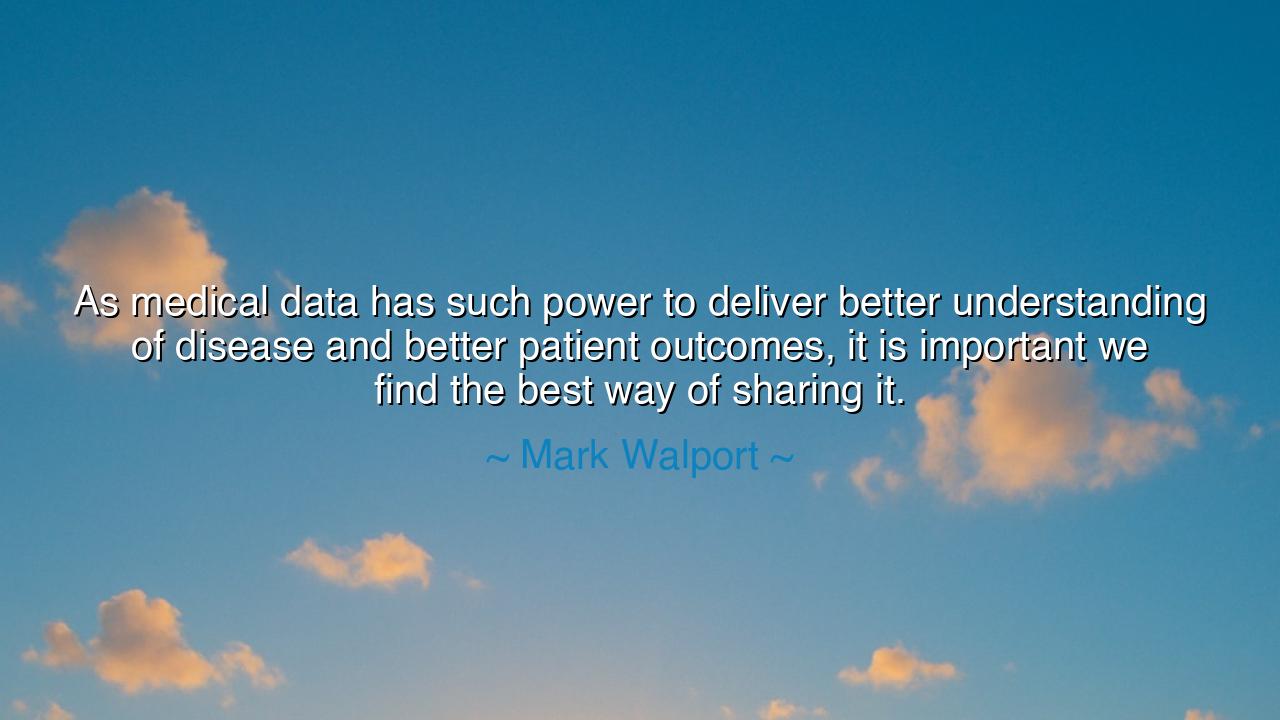
As medical data has such power to deliver better understanding of
As medical data has such power to deliver better understanding of disease and better patient outcomes, it is important we find the best way of sharing it.






The words of Mark Walport speak like a flame passed between hands—bright with purpose and heavy with responsibility: “As medical data has such power to deliver better understanding of disease and better patient outcomes, it is important we find the best way of sharing it.” These are not the words of mere policy or science, but of moral truth. For they remind us that knowledge, when hoarded, becomes stagnant; but when shared, it becomes the breath of progress, the means by which humanity heals itself. His call is a summons to wisdom in the age of information—to wield our power with care, and to let compassion guide the hand that holds the data of life.
Since the dawn of healing, knowledge has been the most sacred medicine. The physicians of old—Hippocrates, Galen, Avicenna—each built their art not in isolation, but upon the wisdom of those who came before them. They recorded their discoveries, their failures, their remedies, and passed them on so that others might heal more swiftly and suffer less. In the monasteries of medieval Europe, monks copied medical texts by candlelight, their pens trembling with the hope that knowledge might one day outlive plague and darkness. This is the lineage to which Walport’s words belong: the eternal belief that the sharing of knowledge is an act of healing in itself.
But in our modern era, the parchment has become the database, and the ink, the language of code. Medical data—the record of the human condition, written in numbers and genes—has become a new kind of scripture, holding within it the patterns of disease, the keys to cure, and the story of our mortality. Yet, as Walport warns, the power of such data is not in its possession, but in its sharing. Locked away in silos of research or guarded by profit and fear, it remains potential unrealized, a lantern unlit in the dark. Only when it is opened—responsibly, ethically, and wisely—can it illuminate the path to better patient outcomes and the understanding of the ailments that bind all humankind.
Consider the tale of Dr. John Snow, who in 1854 faced the terrible cholera outbreak in London. He gathered data—names, addresses, deaths—and mapped them with tireless devotion. By sharing his findings openly with skeptics and authorities alike, he revealed that the source of the disease was not the air, as many believed, but the water. His data broke the chains of ignorance and saved thousands. If he had hoarded his knowledge, if fear or pride had silenced him, the streets of London would have drowned in sorrow. His legacy is proof that shared information becomes a weapon of mercy.
Yet, with such power comes peril. To share medical data is to hold in one’s hands the essence of another’s life—their history, their suffering, their vulnerability. To misuse it is to wound trust, to violate the sacred covenant between healer and patient. Thus, Walport’s call is not for reckless openness, but for enlightened stewardship. He speaks of finding the best way—the balance between privacy and progress, between protection and discovery. For only in balance can we preserve both the dignity of the individual and the destiny of the collective.
In these words, one hears the echo of an older wisdom: that knowledge without compassion is blind, and compassion without knowledge is powerless. The healer’s duty is not only to treat the sick, but to safeguard the truth that may heal the next generation. The sharing of data, when done with integrity, is an act of service to all humanity—a covenant that binds the past to the future. Through it, each discovery becomes a seed, each patient’s story a root, in the great tree of medicine that shelters us all.
So, my child of reason and heart, take this teaching to your own path. Whatever knowledge you hold—whether of medicine, of craft, or of life itself—do not lock it away. Share it with care, with wisdom, and with humility. Let your learning become light for others, as theirs once was for you. Build not walls of secrecy, but bridges of trust. For in the end, Mark Walport’s words remind us that healing is not the work of one mind alone—it is the song of many voices, united in purpose, rising above the walls that divide us. And when that song is sung with both courage and compassion, it becomes what it has always meant to be: the sound of humanity saving itself.






AAdministratorAdministrator
Welcome, honored guests. Please leave a comment, we will respond soon